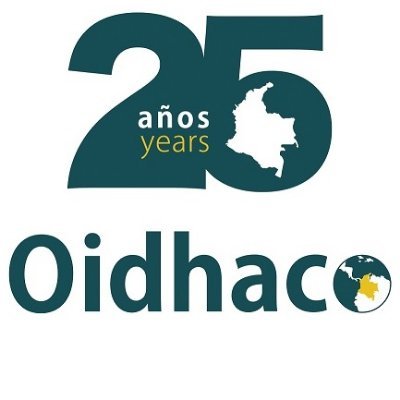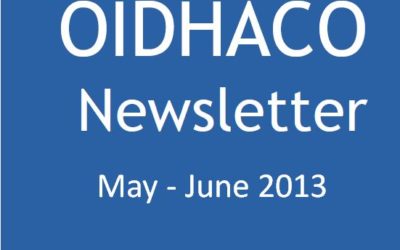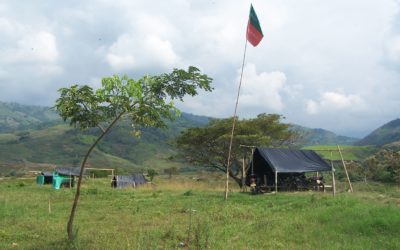Oidhaco: 25 years of joint commitment to the defence of peace and human rights in Colombia
Human Rights, Peacebuilding
In 2020, the International Office for Human Rights – Action Colombia – (Oidhaco) is celebrating its twenty-fifth anniversary as a European network working for peace and human rights in Colombia. For 25 years, Oidhaco has been carrying out advocacy work promoting peace-building and comprehensive respect for human rights in Colombia, in coordination with Colombian civil society. This article reflects on Oidhaco’s historic trajectory and contributions to peacebuilding and is based on interviews with 4 people[1] who played an important role in the organisation’s story.
International Solidarity with Colombia: Putting Human Rights at the Centre
In the late 1980s and early 1990s, Colombia experienced an upsurge in the socio-political violence it has suffered for much of its history, with expressions of violence of such magnitude that they came to the attention of international public opinion. This violence included the 1989 La Rochela massacre, and a worsening of factors such as the expansion of paramilitarism, impunity for state crimes and the breakdown of peace processes[2], which increased violations of human rights and International Humanitarian Law[3].
Peter Drury has worked for international organisations including Oxfam and Amnesty International and was a participant in the first Oidhaco Assemblies. According to Drury “In Colombia, there was a desire for the international community to act: why weren’t they doing more? This question was extremely relevant given the context of the human rights crisis. Despite the strong social movement in Colombia, history was being repeated, impunity and murders were a constant, and there was no international pressure. People started to ask how the situation could be influenced from the outside, seeing that the Colombian government was not taking action to solve the crisis”.
In response to this situation, in the early 1990s in Europe two different expressions of international solidarity with Colombia proved fundamental to the birth of Oidhaco: international solidarity committees in European countries and work on Colombia by European human rights and cooperation organisations.
The first solidarity committees were formed in Germany, Belgium, Norway, the United Kingdom, France and Switzerland, and consisted of networks of European volunteers interested in Latin America because of local political processes, and Colombian exiles who were rebuilding their lives in Europe. For their part, European non-governmental cooperation organisations, such as HEKS, Broederlijk Delen, CAFOD and Misereor, began to include Colombia as part of the focus of their cooperation with Latin America, which had previously been focused on other countries, for example in Central America. “This solidarity had some impact on Colombia’s international activism. It wasn’t politicians who thought about taking action, it was the insistence of social movements that forced some European politicians and businessmen to act”, says Gaby Kuppers, former adviser to the European Parliament’s Green/EFA group.
These organisations and committees promoted urgent action on Colombia from a human rights perspective, highlighting the Colombian State’s responsibility in human rights violations: “A few years earlier the war on drugs had been declared, this was the focus of state cooperation with Colombia, people only talked about drug trafficking and the issue of human rights was hidden. Yes, there was drug trafficking, but also a conflict and a human rights crisis (…) because the situation in Colombia was not only a consequence of drug trafficking; there was a political and economic strategy behind it, which included economic interests and links between the state security forces and paramilitary groups”, according to Peter Drury.
Since it was founded, Oidhaco and its members have emphasised the importance of recognising the armed conflict in Colombia and the fact that the violence is not only the result of a drug war, but of an underlying social and political conflict and a situation of serious human rights violations. International human rights campaigns dedicated to Colombia, such as Amnesty International’s in 1994, entitled “Colombia: Socio-Political Violence: Myth or Reality” were important in mobilising public opinion and European actors.
London, Brussels and Geneva: coordinated and permanent advocacy work on Colombia
In the early 1990s, a number of solidarity organisations and committees began meeting in London once a year to exchange concerns and take joint international advocacy actions. This informal space was called the “London Agreement” and was fundamental to the birth of Oidhaco because it led to recognition by civil society working for Colombia, that while each organisation had its own agenda, it was important to coordinate actions.
“Oidhaco was founded because on the one hand there was a terrible human rights situation in Colombia, and on the other hand, a growing commitment by European organisations. We saw the need to coordinate and make the most of our common efforts and objectives, centred around how to raise international pressure”, says Federico Andreu, the first coordinator of Oidhaco. “As part of this effort, Colombian organisations, who were wondering how to have a louder voice in Europe, also came together”, says Lourdes Castro, one of the first Oidhaco Network Lobbyists.
Bringing together these efforts, the European Conference for Human Rights in Colombia was held in the European Parliamentin Brussels on 9 and 10February, 1995[4]. For the first time, members of the Colombian Government, European governments and the United Nations gathered as part of a European and Colombian civil society initiative to discuss the situation in Colombia. It was the EU’s formal recognition of the need to respond to Colombia’s serious human rights situation. Oidhaco is a direct result of this conference. Given the success of the conference, it was decided to found Oidhaco’s office in Brussels with the aim of monitoring recommendations and coordinating with organisations to organise advocacy work[5] before European institutions, European countries and the United Nations[6].
“The evaluation of the conference was that it was possible to raise Colombia’s human rights profile, and that to do this, the advocacy work being done in different countries had to be coordinated. To build more organised dialogue, more systematic work, and a more programmatic vision”, says Lourdes Castro.
From the outset, Oidhaco was established as a network with members that included different European and international organisations and coordination groups. The network carried out joint actions through Oidhaco’s office in Brussels.
Oidhaco’s mandate included advocacy work before the United Nations in Geneva due to the importance of the Universal Human Rights System. Advocacy was carried out before the former Human Rights Commission “including a specific request for a special rapporteur for Colombia or an independent expert”, says Andreu. “What came out of this work was the idea that we needed to replicate the constant lobbying of European governments also in Geneva, and that this work should not be reserved to just a couple of weeks a year, to encourage the EU to take on UN recommendations”, says Drury. For Lourdes Castro, this strategy aimed to support European countries to bring a human rights agenda before the UN Human Rights Commission, and later, the Council, which remains one of the pillars of Oidhaco’s advocacy work before the United Nations.
Subsequently, in several European countries, coordination spaces were founded comprised of organisations and groups working for human rights in Colombia and they coordinated lobbying work in their countries. At the same time, they were coordinated at the European level through Oidhaco. In Colombia, parallel to the birth of Oidhaco, the Colombia-Europe-United Nations Coordination Group (CCEEU) was created, so that there would be a reference point in Colombia that coordinated advocacy in Europe with Oidhaco and also with the United States. That same year, the Colombian Platform for Human Rights, Democracy and Development was also founded.
Historic milestones in Oidhaco’s advocacy work before the EU and UN
Taking a look at Oidhaco’s history involves understanding its contribution to peacebuilding. Oidhaco has participated in the following processes:
The joint work of Oidhaco and the Colombia-Europe-United Nations Coordination Group (CCEEU), together with that of other European and Colombian organisations, was key to the establishment of an UNHCHR office in Colombia with a strong mandate based on two aspects: technical assistance and monitoring, which lead to the presentation of an annual public report on Colombia before the Human Rights Council. In part, this was due to advocacy work calling for a specific UN instrument on Colombia, which did not result in a rapporteur or expert, but instead lead to the establishment of the Office. The UN’s presence in Colombia is critical, since “its recommendations are levers, they are reference points for national and international advocacy that give credibility to civil society analyses”, Drury tells us.
Another significant moment was the Campaign against Plan Colombia (Paz Colombia Coalition), in which Oidhaco and other Colombian and European organisations in different countries carried out advocacy work so that the EU and its member states did not support the United States’ Plan Colombia, which was a policy of cooperation between the US and Colombian governments, starting in 2000, focused on military cooperation and the fight against drug trafficking. The campaign helped the EU maintain its differentiated cooperation focus with a human rights perspective and its support for territorial peace-building processes, such as the Peace Laboratories. This campaign included European donor roundtables, which also influenced the subsequent London-Cartagena process.
The London-Cartagena process (2003-2007)[7] refers to tripartite roundtables between the Colombian government, European donors and civil society “the achievement of London-Cartagena is that it opened up space for civil society to discuss cooperation issues, with the State and international donors. Why did this happen? Because of the weight of donor roundtables driven by civil society”, says Lourdes. In this context, Oidhaco’s partner organisation, the Alliance of Social and Likeminded Organisations, was founded. This process established the link between international human rights cooperation with European political actors and also emphasised that the EU should appropriate the UN’s recommendations in its foreign policy towards Colombia[8].
The negotiation of the Trade Agreement between the EU and Colombia from 2009 onwards and the signing of the Agreement in 2012 raised great concern in Oidhaco due to the serious human rights violations taking place in Colombia. For Lourdes, establishing a trade agreement with a country in armed conflict showed a lack of coherence between the EU’s human rights policy and its trade policy, “and the EU prioritised business over the situation of armed conflict”. Oidhaco campaigned in Brussels and several European countries where its member organisations are located for the non-ratification of the Trade Agreement. The network highlighted the increase in and systematic nature of extrajudicial executions, also known as “false positives”[9], which increased during the government’s Democratic Security policy and the Trade Agreement negotiations. The Agreement was signed, however the European Parliament included in its 2012 resolutio[10] a request for a roadmap on human, environmental and labour rights in Colombia. Oidhaco is currently monitoring the Agreement from a human rights perspective within the framework established in the Chapter on Trade and Sustainable Development.
Oidhaco believes in a negotiated solution to the armed conflict in Colombia and therefore supports peace processes, including the Havana peace process between the Colombian government and the Farc-Ep, which lead to the 2016 Peace Agreement. Several of Oidhaco’s members supported Colombian civil society proposals presented at the negotiating table and this had an impact on gaining political support for the negotiations from their respective countries and the EU. This continues today through advocacy to support the implementation of the Peace Agreement.
Oidhaco’s continued solidarity with Colombian civil society from a human rights perspective
Oidhaco has forged a relationship with Colombian civil society throughout the last 25 years, and the legitimacy of its advocacy work began with the conference from which Oidhaco was born and in which participated many Colombian delegates. The legitimacy of the network continues today due to Oidhaco’s coordination with civil society organisations and groups in Colombia, and its promotion of Colombian voices on issues of peace and human rights, both from the capital and from different regions of the country.
Oidhaco has accompanied human rights platforms, its members’ partner organisations and different Colombian social movements, opening up spaces for dialogue with political actors from Europe and in the United Nations. This dialogue “has led to the recognition of civil society before the Colombian Government. The government would speak to the international community but would not engage in dialogue with its own citizens; it was the political weight that Colombian civil society gained from speaking with the international community that opened doors for dialogue with the Colombian state. Organisations have gained a space for direct dialogue with the government and other instances of the state that did not exist before”, says Lourdes, who also adds that “for organisations and coordination groups in Colombia, Oidhaco is a really important reference point and its existence is absolutely necessary for Colombian organisations’ work and processes”.
“One of the most important features of Oidhaco is that it is above politicisation: its work focuses on human rights, the fight against impunity, the United Nations Human Rights Recommendations”, says Federico Andreu. Added to this is Oidhaco’s joint lobbying strategy before the EU and the UN, key members of the international community who can support a human rights and peace agenda in a country where there is no recognition of this agenda by the State, unless there is political or economic pressure from the international community. Peter Drury concludes that “the armed conflict is not over, the defence crisis remains critical, paramilitarism still exists. Oidhaco’s original work is as urgent as ever”.
[1] This article is based on 4 interviews with people close to the history of Oidhaco: Lourdes Castro, coordinator of the We Are Defenders Program; Peter Drury, Representative of the Truth Commission in the United Kingdom; Federico Andreu, jurist and author; and Gaby Kuppers, former adviser on international trade in the European Parliament.
[2]For example, Belisario Betancourt’s dialogues with the Farc-EP and M-19 in 1986, and the 1992 Tlaxcala, between the government of Cesar Gaviria and the Farc-EP, ELN and EPL.
[3]These contextual elements were identified by the interviewees.
[4]Supported by the President of the Human Rights Subcommittee (DROI), Germany’s Edith Muller.
[5] Oidhaco originally had 18 members, which have been expanded to 36 in 2020.
[6] Oidhaco works with the European Union and European states, which include not only EU member countries but other non-member European countries, such as Norway, Switzerland and the UK.
[7]http://www.bivipas.unal.edu.co/bitstream/10720/513/5/L-231-PNUD-2007-311.pdf
[8]London Declaration of 10 July 2003. Available at: https://www.hchr.org.co/documentoseinformes/documentos/internacional/LondonDeclaration.pdf
[9]http://www.oidhaco.org/uploaded/content/category/1072246653.pdf
[10] https://www.europarl.europa.eu/doceo/document/TA-7-2012-0249_EN.html
See more at:
https://www.oidhaco.org/en/oidhaco-25-years-of-joint-commitment-to-the-defence-of-peace-and-human-rights-in-colombia/




